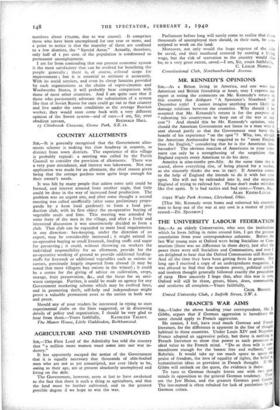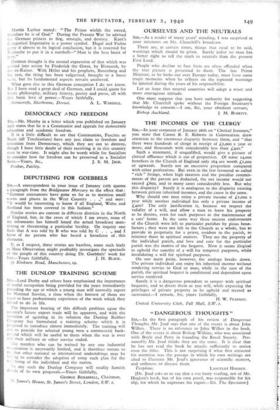FRANCE'S WAR AIMS SIR,—Under the above heading your correspondent, Mr.
J. Gibbs, argues that if German aggression is hereditary the same should apply to French aggression.
He cannot, I feel, have read much German and French literature, for the difference is apparent in the line of thought habitual to these countries. Under Louis XIV and Napoleon France adopted an aggressive policy, but there is nothing In French literature to show that power as such possesses as ideal value to the French mind. "Do as thou wilt is com- mandment enough for the honest free and welborn," Rabelais. It would take up too much space to quote the praise of freedom, the love of equality of rights, the belief ifl humanitarian ideas so prevalent in French thought. If AIL Gibbs will embark on the quest, the evidence is there.
To turn to German thought leaves one with two areal minds in opposition to the general German tendency. There are the Jew Heine, and the greatest German poet Goethe.. The last-named is often rebuked for lack of patriotism by hIs German critics.
Martin Luther stated: "The Prince wields the sword, therefore he is of God." During the Peasant War he advised the German princes to flog, strangle, and destroy. Kant's Categorical Imperative is a power symbol. Hegel and Fichte carry it almost to its logical conclusion, but it is reserved for Nietzsche to put it in a nutshell—" Man is the best beast of prey."
German thought is the mental expression of that which was carried into action by Frederick the Great, by Bismarck, by the ex-Kaiser. With Hitler and his prophets, Rosenberg and the rest, the thing has been vulgarised, brought to a baser scale, but its fundamental aspects remain unaltered.
What gave rise to this German conception I do not know. But I have read a great deal of German, and I could quote for hours philosophy, military history, poetry and prose, all with this basic love of power.—Yours faithfully,
Stonecroft, Sherborne, Dorset. A. L. WARDELL.







































 Previous page
Previous page